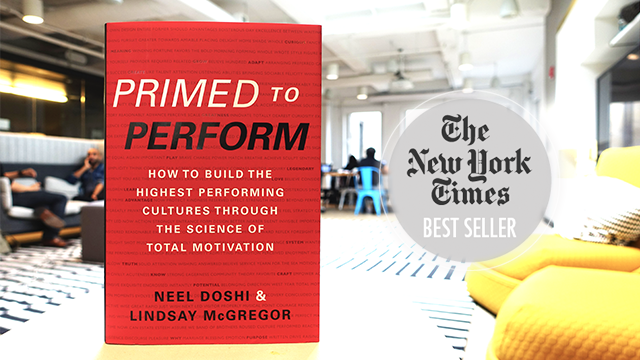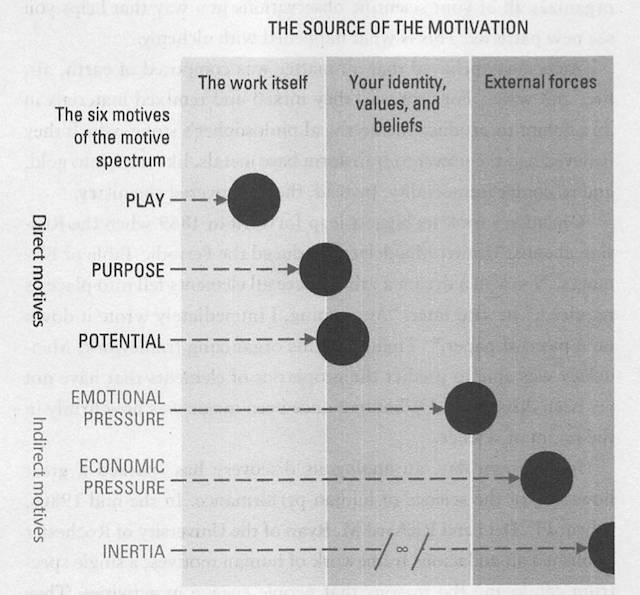
Why do you go to work? Chances are it’s got something to do with money. But as most of us know, it’s more complicated than that. “There is a spectrum of reasons why people do their jobs,” write Neel Doshi and Lindsay McGregor in Primed to Perform: How to Build the Highest Performing Cultures Through the Science of Total Motivation. “Understanding that spectrum is the key to creating the highest levels of performance.”
The authors argue there are six reasons we do anything. The first three they call indirect motivations and the latter three are direct motivations.

The Direct Motives
Play
You’re most likely to lose weight—or succeed in any other endeavor— when your motive is play. Play occurs when you’re engaging in an activity simply because you enjoy doing it. The work itself is its own reward. Scientists describe this motive as “intrinsic.”
Play is what compels you to take up hobbies, from solving crossword puzzles to making scrapbooks to mixing music. You may find play in weight loss by experimenting with healthy recipes or seeking out new restaurants that offer healthy options. Many of us are lucky enough to find play in the workplace too, when we do what we do simply because we enjoy doing it.
Curiosity and experimentation are at the heart of play. People intrinsically enjoy learning and adapting. We instinctively seek out opportunities to play.
[…]
Play at work should not be confused with your people playing Ping Pong or foosball in the break room. For your people to feel play at work, the motive must be fueled by the work itself, not the distraction. Because the play motive is created by the work itself, play is the most direct and most powerful driver of high performance.
Purpose
A step away from the work itself is the purpose motive. The purpose motive occurs when you do an activity because you value the outcome of the activity (versus the activity itself). You may or may not enjoy the work you do, but you value its impact. You may work as a nurse, for example, because you want to heal patients. You spend your career studying culture because you believe in the impact your work can have on others. Dieters may not enjoy preparing or eating healthy meals, but they deeply value their own health, an outcome of healthy eating.
You feel the purpose motive in the workplace when your values and beliefs align with the impact of the work. Apple creates products that inspire and empower its customers, a purpose that is compelling and credible. …
The purpose motive is one step removed from the work, because the motive isn’t the work itself but its outcome. While the purpose motive is a powerful driver of performance, the fact that it’s a step removed from the work typically makes it a less powerful motive than play.
Potential
The potential motive occurs when you find a second order outcome (versus a direct outcome) of the work that aligns with your values or beliefs. You do the work because it will eventually lead to something you believe is important, such as your personal goals.
Dieters motivated by potential eat healthfully to achieve other things they care about—the ability to run faster on the football field, for example, or to keep up with their kids. When a company describes a job as a good “stepping-stone,” they’re attempting to instill the potential motive.
These are the direct motives. Direct because they generally connect to the work itself.
As a result, they typically result in the highest levels of performance. If you remember only one thing from Primed to Perform, it should be that a culture that inspires people to do their jobs for play, purpose, and potential creates the highest and most sustainable performance.
Not all motives correlate with higher performance. Motives that don’t connect to the work itself typically reduce performance.
The Indirect Motives
Emotional Pressure
The first indirect motive, emotional pressure, occurs when emotions such as disappointment, guilt, or shame compel you to perform an activity. These emotions are related to your beliefs (your self- perception) and external forces (the judgments of other people). The work itself is no longer the reason you’re working.
You may practice the piano so you don’t disappoint your mother. You may stay in a job because its prestige boosts your self-esteem. A dieter may eat healthy meals because he’s embarrassed by how he looks, or because he feels guilty when his partner catches him with his hand in the cookie jar.
In each case, the motive is not directly connected to the work. It is indirect.
When your motive to work is emotional pressure, your performance tends to suffer. … High-performing cultures reduce emotional pressure. … [E]motional pressure is the weakest of the three indirect motives. The effects of economic pressure can be much worse.
Economic Pressure
Economic pressure is when you do an activity solely to win a reward or avoid punishment. The motive is separate from the work itself and separate from your own identity (see Figure 3 for an illustration of this separation). In business, this often occurs when you’re trying to gain a bonus or a promotion, avoid being fired, or escape the bullying of an angry boss. Economic pressure can occur outside the workplace, whenever you feel forced to do something.
[…]
The biggest misconception about the economic motive is that it is strictly a matter of money. In a study we conducted involving more than ten thousand workers, we looked to see how the economic motive changes with household income. We expected to find that the people with the least income experienced the highest economic pressure. Instead, we learned that income and the economic motive were statistically unrelated. People at any income level can feel economic pressure at work.
This is an important insight. Money alone does not cause the economic motive.
[…]
There are situations where money works, and situations where it doesn’t. It all depends on whether or not the reward or punishment is the motive behind the activity, and whether the activity would benefit from adaptive performance.
Inertia
The most indirect motive of all is inertia. With inertia, your motive for working is so distant from the work itself that you can no longer say where it comes from—you do what you do simply because you did it yesterday. This leads to the worst performance of all. … As destructive and insidious as it is, inertia is surprisingly common in the workplace.
I’ll have more to say on culture but needless to say, this is only one lens.
Source – ‘Primed to Perform’ book and https://www.farnamstreetblog.com/2015/10/reasons-we-work/
You can apply for Young India Challenge #DoWhatYouLove here https://humancircle.in/youngindiachallenge/apply-now.html

Leave a Reply